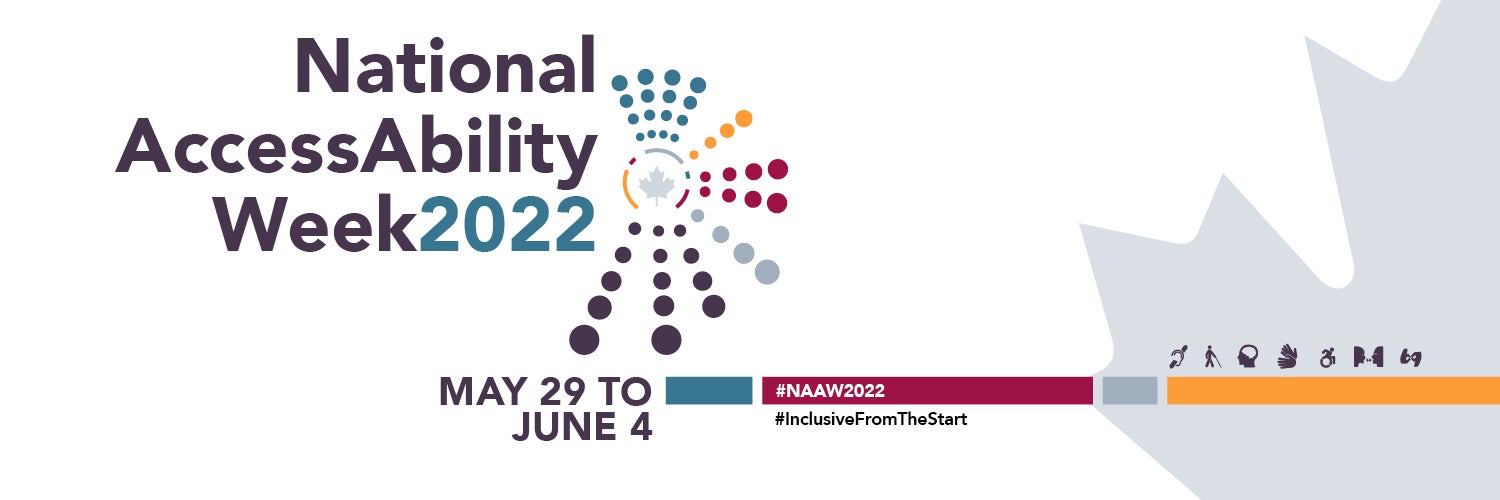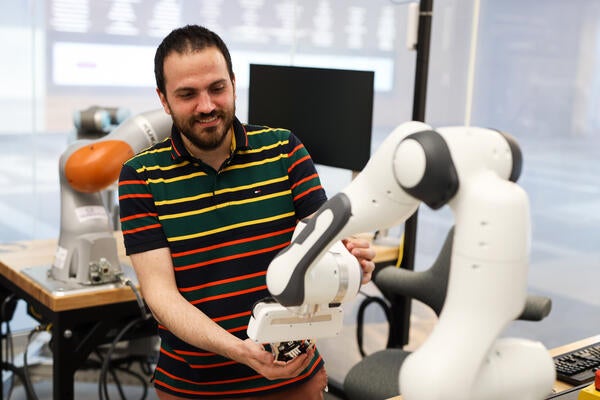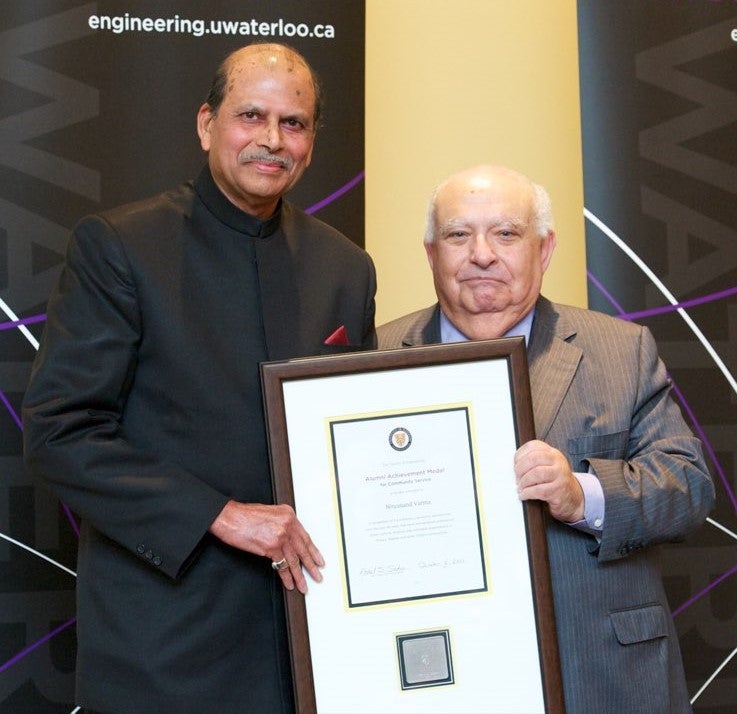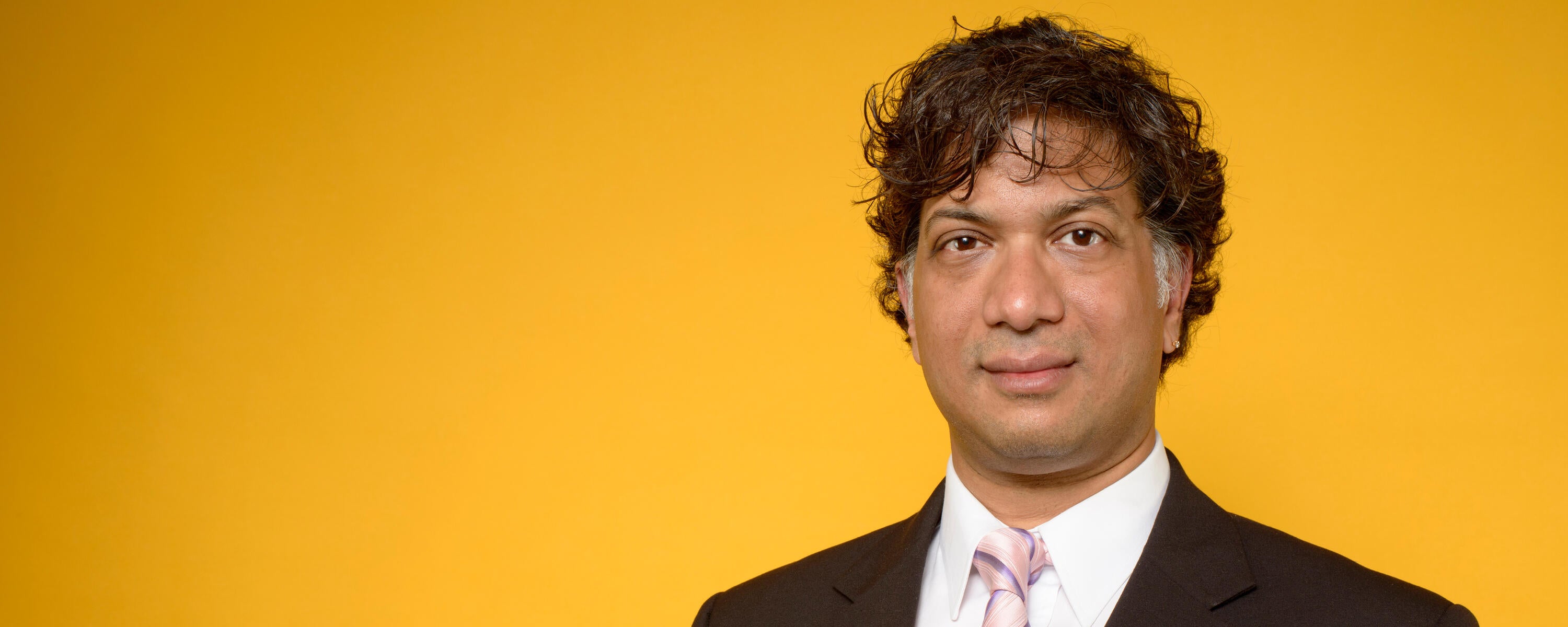Editor:
Brandon Sweet
University Communications
bulletin@uwaterloo.ca
It's National AccessAbility Week: webinars, resources, and more

National AccessAbility Week (NAAW) is happening this week, from May 29 to June 4, 2022, and is a time to celebrate the contributions of Canadians with disabilities and promote efforts to increase accessibility and inclusion in Canada. This year, the theme for National AccessAbility Week is “Inclusive from the start.” Imagine a Canada where no one is left out. A Canada that does not just accommodate disability, but one that is disability inclusive from the start.
At the University of Waterloo, we believe in developing a culture that fosters inclusivity and a sense of belonging. Every campus member works towards the University’s goal of advancing programs, policies and processes that foster equity, diversity, and inclusivity. We are committed to achieving barrier free accessibility for persons with disabilities studying, visiting and/or working at Waterloo.
Follow #InclusiveFromTheStart and #NAAW2022 on social media for more updates throughout National AccessAbility Week. Considering joining events and participate in the conversation around creating an accessible and inclusive Canada from the start.
Learn more about events and resources to support National AccessAbility Week.
Completing the arc

Members of the Varma family, including Nityanand (second from left), Shashi (second from right) and Amar (right) pose for a group shot.
By Brian Caldwell. This article originally appeared on Waterloo News.
Six decades after travelling halfway around the world to take a chance on a new university in Canada, a proud alumnus is helping it grow in a way he would never have imagined possible.
Nityanand Varma was the proverbial immigrant with eight dollars in his pocket when he left his native India in the early 1960s to do a master’s degree in civil engineering at the University of Waterloo.
Now, as patriarch of a family that has maintained strong ties to Waterloo Engineering ever since, he is instrumental in a $1-million contribution to fund a new professorship in robotics.

Gennaro Notomista holds the new Varma Family Professorship in Robotics at Waterloo Engineering.
“It’s an arc, a journey, that I think is important to share,” said Varma’s son Amar, a serial entrepreneur who also earned an engineering degree at Waterloo. “This is representative of my parents’ life’s work and also of a generation that came to this country with an insatiable appetite to make life better for themselves.”
The donation helped create the Varma Family Professorship in Robotics, which is held by Gennaro Notomista, a young researcher from Napoli, Italy who comes to the post after graduate studies in Germany and the United States, and a year as a postdoctoral researcher in France.
Notomista, a professor of electrical and computer engineering, was part of a team at the Georgia Institute of Technology that developed an autonomous device called the SlothBot, a slow-moving, solar-powered robot that takes environmental readings while moving through forest treetops on a wire.

Nityanand Varma (left) receives a Waterloo Engineering award for community service from former dean Adel Sedra in 2011.
He plans to advance that work at Waterloo, where he was attracted in part by the state-of-the-art RoboHub and its function as umbrella facility for robotics researchers, to help understand and address urgent issues posed by climate change.
“Autonomy allows robots to explore environments which are hostile to humans, so they can be very useful for all of us,” Notomista said. “My goal is to enable robots to survive in these unknown, unpredictable environments.
“I think we are very, very late in trying to solve the serious environmental problems we face. We need to focus our efforts and we need to act now to protect and improve the health of our planet.”
In the near term, Notomista is building small SlothBots – likely about 50 centimetres long – for deployment to monitor environment conditions in Canada, the U.S. and Europe.
'Idea is for robots to be resilient'
He is also optimistic about the potential of long-duration autonomous robots to make a difference in fields as diverse as agriculture, traffic monitoring and space exploration.
“The idea is for the robots to be resilient to environmental conditions, as well as unexpected failures of the robots themselves, by leveraging their structures as well as their control algorithms,” Notomista said.
The untapped potential of robots to improve human lives was at the heart of the donation by the Varma family. So, too, was a desire to give other students the educations and opportunities Nityanand and Amar benefited from.
Nityanand actually earned two graduate degrees from Waterloo, one in civil engineering in 1964, and another in management sciences and systems engineering in 1970, before enjoying a long career as an engineer at Bell Canada, as well as working as an entrepreneur.
'We feel like this will help'
Raising a family with his wife, Shashi, in the Ottawa area, he also made a name for himself through volunteer work and was honoured by Waterloo Engineering in 2011 with the Alumni Achievement Medal for Community Service.
Amar, who has two older sisters, earned an electrical and computer engineering degree from Waterloo in 1999 and is continuing his life’s work as an entrepreneur and community builder.
He sees the new professorship as a testament to the hard work and determination of his parents, and is hopeful it will have a lasting impact on both future students and the field of robotics.
“To the extent that robotics can make human life better, we want to support that as a family,” Amar said. “We feel like this will help.”
Anindya Sen appointed Associate Director of Cybersecurity and Privacy Institute

By Mayuri Punithan, Cybersecurity and Privacy Institute.
Professor Anindya Sen (Economics) has been appointed Associate Director of the Waterloo Cybersecurity and Privacy Institute, a multi- and interdisciplinary research centre with more than 88 research members from across the faculties. Sen is not new to leadership, having held (and currently holding) positions including director of the Master of Public Service program, Acting Associate Dean of Arts, Co-operative Education and Planning, and founding director of the Graduate Diploma in Computational Data Analytics for the Social Sciences & Humanities (CDASH).
As an economist and policymaker, Anindya Sen has always been fascinated by the concept of ‘choice’.
This fascination became fundamental to his primary research interests, continually asking, “Why do consumers make certain choices? What was their decision-making process?” For example, Sen often noticed that many consumers were willing to give up private information to gain access to a product, such as mobile apps. Many mobile services ask if they can install cookies, which can track personal information. Major websites such as Google and Facebook often sell users’ personal information to advertisers. What intrigued Sen the most was that people often resisted sharing information with the government but were extremely willing to share sensitive information with the entities on the web in consumer interactions. Sen started to research more about the lengths consumers would go to give up their privacy and information in these interactions. He hopes to create policies where consumers have rights to the data that they share online, and whether they should receive a return for products where their data was used to create them.
From there, Sen became acquainted with the field of cybersecurity and privacy. While working as the director for UWaterloo’s Masters of Public Service program, he was recommended to join CPI due to their research opportunities. As one of CPI’s researchers, he focuses on data science, security and privacy, as well as the human and societal aspects of security and privacy. In late 2020, he organized a conference on privacy and data collection through contract tracing apps, which CPI co-sponsored.
Sen has been teaching at UWaterloo since 1998. One of the aspects Sen enjoys most about Waterloo is its growing diversity. As well, he enjoys its vibe of “hunger for success, innovation, and entrepreneurship”, he feels that it permeates everywhere. “It's in the city and the university”. He believes CPI can play a significant role in Waterloo’s innovative culture by showing how CPI’s research can significantly enhance technology and its implementation, and how people interact with it. Moreover, he hopes CPI can help foster a cybersecurity ecosystem within Waterloo. Unfortunately, many people do not realize how much information they reveal to the web. This is dangerous as hackers can easily harm someone, for example, by finding their financial details or home alarm information. By bringing in CPI’s researchers from various faculties such as engineering to social sciences, he hopes to inform Waterloo staff and students about these risks to better protect their privacy.
As the new Associate Director, he wants to encourage students to seek research opportunities within the cybersecurity and privacy field. Since “we're becoming a digital society, [that is being] governed by web interactions [and] apps”, these are therefore significant issues that must be studied. Some issues include consumers’ data rights and ethical information collection by businesses. Under this scope, he hopes to include researchers of all faculties, not just STEM. By encouraging these opportunities, we can help create and support this new cybersecurity ecosystem.
Sen hopes that within the next 5 years, CPI can advise the federal government on the best policies for cybersecurity and privacy, such as educating citizens about the benefits and consequences of becoming a digital society and how to make the best decisions. Most importantly, he wants to ensure certain members of society are not excluded. He mentions how his parents, who are in their 80s, often struggle with using apps to access vaccine passports or restaurants throughout the pandemic. His experience indicates that cybersecurity and policy information should be accessible to the general public. Overall, he hopes CPI can bring empathy and compassion within this digital divide.
A new look for Concur
A message from Finance.
Concur is unveiling an updated look and feel for their Expense module and the University of Waterloo will be early adopting these updates on Monday, July 18, prior to their mandatory rollover scheduled for October 1, 2022. Updates include a more accessible design and a more user friendly and intuitive end-user experience. Please note, the user experience for Approvers, Administrators, and Processors remains largely the same at this time.
What does this mean to me?
No action is required on your part and impact to our Concur users is expected to be minimal. Effective July 18, Concur users will experience a slightly different look and feel the next time you log into Concur, but overall, the updates are meant to be a much more user-friendly and easier to use end product. Functionality has largely not changed. Expenses or expense reports created in the current Legacy User Interface (UI) will not be affected when we transition to the new NextGen UI on July 18.
What is changing?
July 18 onward, the first time you log into Concur Expense, you will see a three-slide product tour introducing the updated NextGen UI which briefly explains the most notable changes and their benefits. For a detailed list of all changes, refer to the Concur End User Guide, however, here are a few key highlights:
- Your Report Library will now be consolidated with your Active Claims for ease of viewing pertinent information about your reports all in one place
- The screens and fields will be larger and easier to navigate
- Required fields will now be marked with a red asterisk instead of a red band at the left edge of the field
- The “Missing Receipt Affidavit” name will change to the “Missing Receipt Declaration”
What is not changing?
Features that are currently used in the Legacy UI will be available for use in the new NextGen UI.
There will be no impact to any back-end processes, financial extracts, or historical data.
The experience for Approvers, Administrators, and Processors is not being updated at this time. Concur is planning to roll out future updates to include similar changes to the Approver and Processor screens however, this updated UI for Approvers is under product development and Finance will communicate these changes as they become available.
Resources:
- NextGen UI (Finance Knowledge Base)
- NextGen UI FAQ (Finance Knowledge Base)
- Concur End User Guide (Concur)
- Concur Expense User Resources for NextGen UI including videos, guides, tip sheets (Concur)
What if I have questions?
If you would like to get a sneak peek and opt-in early, or if you have questions about the new NextGen Concur UI, please contact us via the Finance Jira Portal.
Notes as Convocation nears
"Spring convocation is fast approaching and parking spaces on campus will be pushed to a maximum," says a note from Parking Servies. "To ensure our graduating students and their families have a seamless memorable experience, we are continuing the relocation protocol for this term's convocation."
Parking lots M, N, W, L, and R will be used to accommodate guests. The following relocations will take place from Saturday, June 11 to Saturday June 18 inclusive.
Accommodations for active permit holders during Spring Convocation 2022:
- Staff Permits for L - Valid in Q or X;
- Staff Permits for R - Valid in J, S, or X;
- Student Permits - Valid in C, or X.
For more information visit https://uwaterloo.ca/parking/convocation.
There's still time to register for Convocation via the online ticketing system. Graduands are eligible to reserve two guest tickets. All guests must be registered by June 5 to attend the in-person ceremony. For those who would like more than two guest tickets, they will have the option to join a waitlist. Should additional tickets be available they will be notified following the June 5 deadline.
Registration in advance is a must.
Graduands are automatically registered for their convocation ceremony when they register their guests. Graduands who do not require any guest tickets are asked to email convocation@uwaterloo.ca to register to attend. Graduands must register by June 5 to ensure that they receive their diploma at the ceremony. Ceremonies will be livestreamed and available to watch on the convocation website.
Link of the day
When and Where to get support
Students can visit the Student Success Office online for supports including academic development, international student resources, immigration consulting, leadership development, exchange and study abroad, and opportunities to get involved.
Instructors looking for targeted support for developing online components for blended learning courses, transitioning remote to fully online courses, revising current online courses, and more please visit Agile Development | Centre for Extended Learning | University of Waterloo (uwaterloo.ca).
Instructors can visit the Keep Learning website to get support on adapting their teaching and learning plans for an online environment.
Course templates are available within your course in LEARN to help you build and edit your content and assignment pages quickly.
The following workshops, webinars, and events are offered by the KL team (CTE, CEL, ITMS, LIB):
-
Scholarship of Teaching and Learning (SoTL) Methods – self-directed, continuous self-enrollment course in LEARN.
-
Independent Blended Course Design (iBlend) - self-directed, continuous self-enrollment course in LEARN.
-
Copyright Overview for Waterloo Instructors and Staff - self-directed, continuous self-enrollment course in LEARN.
-
Independent Remote Course Design Essentials (iReCoDE)- self-directed, continuous self-enrollment course in LEARN.
-
Supporting Student Mental Health (for Instructors) – self-directed, continuous self-enrollment course in LEARN.
-
NEW - PebblePad Users Group (CTE7526), Thursday, June 2, 1:00 p.m. to 2:30 p.m.
-
NEW - SoTL Stories, June 15, 1:00 p.m. to 2:00 p.m.
Supports are available for employees returning to campus. Visit IST’s Hybrid Work and Technology guidelines and workplace protocols to assist with the transition.
The Writing and Communication Centre has virtual services and programs to help undergrads, grad students, postdocs and faculty members with academic writing.
- Meet with writing advisors in one-to-one appointments to brainstorm, draft, revise, and polish. No time for an appointment? Try email tutoring for undergrads.
- Beat isolation and make writing progress at weekly Virtual Writing Cafés for grad students and faculty or PJ-Friendly Writing Groups for Undergrads.
- Take an online workshop or apply to our popular Dissertation Boot Camp program.
- Faculty can request custom in-class workshops for their courses, or the WCC can facilitate any existing workshops for student groups.
- Course-integrated support available. Attention faculty and instructors: The application form for Writing and Communication Centre course-integrated support is now available online. We offer five unique support streams for your courses including synchronous and asynchronous workshops and monitored discussion boards.
Co-op students can get help finding a job and find supports to successfully work remotely, develop new skills, access wellness and career information, and contact a co-op or career advisor.
The Centre for Career Action (CCA) has services and programs to support undergrads, grad students, postdocs, alumni, and employees in figuring out what they value, what they’re good at, and how to access meaningful work, co-op, volunteer, or graduate/professional school opportunities. Questions about CCA's services? Live chat, call 519-888-4047, or stop by our front desk in the Tatham Centre 8:30 a.m. to 4:30 p.m., Monday to Friday.
Drop-in to Warrior Virtual Study Halls on Wednesdays from 5:30 p.m. to 7:00 p.m. Come together in this virtual space to set goals and work independently or in groups each week.
Renison's English Language Institute continues to offer virtual events and workshops to help students practice their English language skills.
If you feel overwhelmed or anxious and need to talk to somebody, please contact the University’s Campus Wellness services, either Health Services or Counselling Services. You can also contact the University's Centre for Mental Health Research and Treatment. Good2Talk is a post-secondary student helpline available to all students.
The Library is open with expanded hours for access to book stacks, drop-in individual study space, bookable group study rooms, drop-in access to computers and printers, book pick-up services and IST Help Desk support. Librarian consultations, Special Collections & Archives and the Geospatial Centre are available by appointment. Full details on current services and hours are available on the Library’s COVID-19 Update webpage.
The Faculty Association of the University of Waterloo (FAUW) continues to advocate for its members. Check out the FAUW blog for more information.
The University of Waterloo Staff Association (UWSA) continues to advocate for its members. Check out the UWSA blog for more information.
The Sexual Violence Prevention and Response Office (SVPRO) supports all members of the University of Waterloo campus community who have experienced, or been impacted, by sexual violence. This includes all students, staff, faculty and visitors on the main campus, the satellite campuses, and at the affiliated and federated Waterloo Institutes and Colleges. For support, email: svpro@uwaterloo.ca or visit the SVPRO website.
The Office of Indigenous Relations is a central hub that provides guidance, support, and resources to all Indigenous and non-Indigenous campus community members and oversees the University's Indigenization strategy.
The Waterloo Indigenous Student Centre, based at St. Paul’s University College, provides support and resources for Indigenous students, and educational outreach programs for the broader community, including lectures, and events.
WUSA supports for students:
Peer support - MATES, Glow Centre, RAISE, Women’s Centre - Visit https://wusa.ca/services/wusa-peer-support to book an appointment either in person or online for the Fall term.
Food Support Service food hampers are currently available from the Turnkey Desk 24/7 in the Student Life Centre. Drop off locations are also open again in SLC, DC, DP, SCH and all residences.
Co-op Connection all available online. Check https://wusa.ca for more details.
Centre for Academic Policy Support - CAPS is here to assist Waterloo undergraduates throughout their experience in navigating academic policy in the instances of filing petitions, grievances and appeals. Please contact them at caps@wusa.ca. More information is available.
WUSA Student Legal Protection Program - Seeking legal counsel can be intimidating, especially if it’s your first time facing a legal issue. The legal assistance helpline provides quick access to legal advice in any area of law, including criminal. Just call 1-833-202-4571.
Empower Me is a confidential mental health and wellness service that connects students with qualified counsellors 24/7. They can be reached at 1-833-628-5589.
GSA-UW supports for graduate students:
The Graduate Student Association (GSA-UW) supports students’ academic and social experience and promotes their well-being.
Advising and Support - The GSA advises graduate students experiencing challenges and can help with navigating university policies & filing a grievance, appeal, or petition.
Mental Health covered by the Health Plan - The GSA Health Plan now has an 80 per cent coverage rate (up to $800/year) for Mental Health Practitioners. Your plan includes coverage for psychologists, registered social workers, psychotherapists, and clinical counselors.
Dental Care - The GSA Dental Plan covers 60 to 70 per cent of your dental costs and by visiting dental professionals who are members of the Studentcare Networks, you can receive an additional 20 to 30 per cent coverage.
Student Legal Protection Program - Your GSA fees give you access to unlimited legal advice, accessible via a toll-free helpline: +1-833-202-4571. This advice covers topics including housing disputes, employment disputes, and disputes with an academic institution.
The Graduate House: Open Monday to Tuesday 11:30 a.m. to 7:00 p.m. and Wednesday to Friday 11:30 a.m. to 9:00 p.m. We’re open to all students, faculty, staff, and community members. The Graduate House is a community space run by the GSA-UW. We’re adding new items to the menu. Graduate students who paid their fees can get discounts and free coffee.
When and Where (but mostly when)
Warriors vs. Laurier Blood Donation Battle. Join our “Waterloo Warriors” team on the Blood.ca website or app. #ItsInYouToGive
Equity and inclusion in industry sponsored contract research and commercialization consultations for researchers, Monday, May 9 to Friday, June 3. Sign up for an interview timeslot.
NEW - National AccessAbility Week 2022, Sunday, May 29 to Saturday, June 4.
NEW - UW Staff Board Foundations workshop, Wednesday, June 1, 4:00 p.m., Microsoft Teams, Register for Session 002.
NEW - Interviewing for Insight, Thursday, June 2, 5:30 p.m.
Alumni Weekend, Saturday, June 4, 9:00 a.m. to 9:00 p.m.
Paint Brubacher House!, Brubacher House Artist-in-Residence Workshops with Yulia Balobanova, Saturday, June 4, 3:30 p.m., BRH (Brubacher House, North Campus UW).
TD Walter Bean Visiting Professorship: faculty & graduate student meetings, Monday, June 6 to Friday, June 10.
“Moving Forward by Slowing Down: Considering Diverse Perspectives on Drug Decriminalization and Legalization,” in person or online for the Waterloo community (online for the general public). Tuesday, June 7, 1:00 p.m. to 3:30 p.m. Keynote: Dr. João Goulão, Ministry of Health, Portugal. Followed by a panel moderated by Globe and Mail journalist André Picard.
Master of Taxation Virtual Information Session, Wednesday, June 8, 4:00 p.m.
CPI Talk: Digital Disinformation and Democracy, Wednesday, June 8, 6:30 p.m., Zoom.
Building Respectful Research Relationships with Indigenous Communities Webinar, Indigenous History Month 2022, Thursday, June 9, 12:00 p.m.